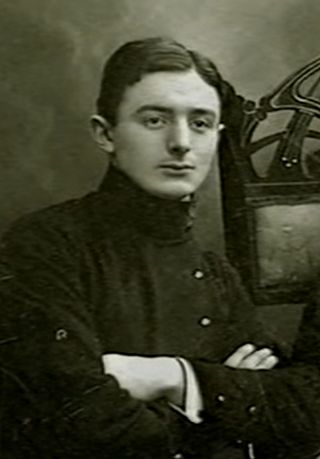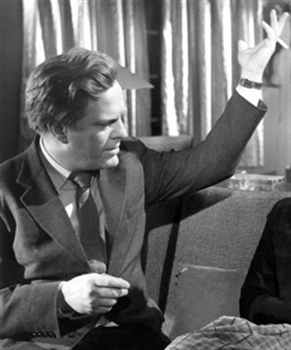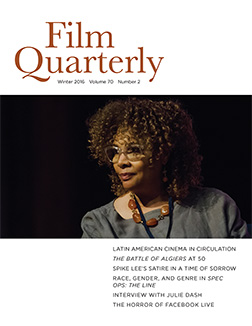
Cahiers du Cinéma is a French film magazine co-founded in 1951 by André Bazin, Jacques Doniol-Valcroze, and Joseph-Marie Lo Duca. It developed from the earlier magazine Revue du Cinéma involving members of two Paris film clubs—Objectif 49 and Ciné-Club du Quartier Latin.

Dziga Vertov was a Soviet pioneer documentary film and newsreel director, as well as a cinema theorist. His filming practices and theories influenced the cinéma vérité style of documentary movie-making and the Dziga Vertov Group, a radical film-making cooperative which was active from 1968 to 1972. He was a member of the Kinoks collective, with Elizaveta Svilova and Mikhail Kaufman.

Karel Reisz was a Czech-born British filmmaker and film critic, one of the pioneers of the new realist strain in British cinema during the 1950s and 1960s. Two of the best-known films he directed are Saturday Night and Sunday Morning (1960), a classic of kitchen sink realism, and the romantic period drama The French Lieutenant's Woman (1981).

The New Wave, also called the French New Wave, is a French art film movement that emerged in the late 1950s. The movement was characterized by its rejection of traditional filmmaking conventions in favor of experimentation and a spirit of iconoclasm. New Wave filmmakers explored new approaches to editing, visual style, and narrative, as well as engagement with the social and political upheavals of the era, often making use of irony or exploring existential themes. The New Wave is often considered one of the most influential movements in the history of cinema.

The Passion of Joan of Arc is a 1928 French silent historical film based on the actual record of the trial of Joan of Arc. The film was directed by Carl Theodor Dreyer and stars Renée Jeanne Falconetti as Joan. It is widely regarded as a landmark of cinema, especially for its production, Dreyer's direction and Falconetti's performance, which is often listed as one of the finest in cinema history. The film summarizes the time that Joan of Arc was a captive of England, depicting her trial and execution.

Tokyo Story is a 1953 Japanese drama film directed by Yasujirō Ozu and starring Chishū Ryū and Chieko Higashiyama, about an aging couple who travel to Tokyo to visit their grown children.
Sight and Sound is a monthly film magazine published by the British Film Institute (BFI). Since 1952, it has conducted the well-known decennial Sight and Sound Poll of the Greatest Films of All Time.

Seth Holt was a Palestinian-born British film director, producer and editor. His films are characterized by their tense atmosphere and suspense, as well as their striking visual style. In the 1960s, Movie magazine championed Holt as one of the finest talents working in the British film industry, although his output was notably sparse.
John Russell Taylor is an English critic and author. He is the author of critical studies of British theatre; of critical biographies of such figures in film as Alfred Hitchcock, Alec Guinness, Orson Welles, Vivien Leigh, and Ingrid Bergman; of Strangers in Paradise: The Hollywood Emigres 1933–1950 (1983); and several books on art.
David Robinson is an English film critic and author. He is a former film critic for both the Financial Times and The Times and wrote the official biography of Charlie Chaplin.
Raymond Durgnat was a British film critic, who was born in London to Swiss parents. During his life he wrote for virtually every major English language film publication. In 1965 he published the first major critical essay on Michael Powell, who had hitherto been "fashionably dismissed by critics as a 'technician's director'", as Durgnat put it.
Asian cinema refers to the film industries and films produced in the continent of Asia. However, in countries like the United States, it is often used to refer only to the cinema of East Asia, Southeast Asia and South Asia. West Asian cinema is sometimes classified as part of Middle Eastern cinema, along with the cinema of Egypt. The cinema of Central Asia is often grouped with the Middle East or, in the past, the cinema of the Soviet Union during the Soviet Central Asia era. North Asia is dominated by Siberian Russian cinema, and is thus considered part of European cinema.

Film Quarterly (FQ), published by University of California Press, is a journal devoted to the study of film, television, and visual media. When FQ was launched in 1945, it was considered "the first serious film journal in the United States, with those most interested in the subject at the helm."
Peter Wollen was an English film theorist and filmmaker. He studied English at Christ Church, Oxford. Both political journalist and film theorist, Wollen's Signs and Meaning in the Cinema (1969) helped to transform the discipline of film studies by incorporating the methodology of structuralism and semiotics. He taught film at a number of universities and was Professor Emeritus at the University of California, Los Angeles at the time of his retirement from academe in 2005.
Penelope Houston was an English film critic and journal editor. She edited Sight & Sound for almost 35 years.

Whisky Galore! is a 1949 British comedy film produced by Ealing Studios, starring Basil Radford, Bruce Seton, Joan Greenwood and Gordon Jackson. It was the directorial debut of Alexander Mackendrick; the screenplay was by Compton Mackenzie, an adaptation of his 1947 novel Whisky Galore, and Angus MacPhail. The story—based on a true event, the running aground of the SS Politician—concerns a shipwreck off a fictional Scottish island, the inhabitants of which have run out of whisky because of wartime rationing. The islanders find out the ship is carrying 50,000 cases of whisky, some of which they salvage, against the opposition of the local Customs and Excise men.
An auteur is an artist with a distinctive approach, usually a film director whose filmmaking control is so unbounded and personal that the director is likened to the "author" of the film, thus manifesting the director's unique style or thematic focus. As an unnamed value, auteurism originated in French film criticism of the late 1940s, and derives from the critical approach of André Bazin and Alexandre Astruc, whereas American critic Andrew Sarris in 1962 called it auteur theory. Yet the concept first appeared in French in 1955 when director François Truffaut termed it policy of the authors, and interpreted the films of some directors, like Alfred Hitchcock, as a body revealing recurring themes and preoccupations.

A film, also known as a movie or motion picture, is a work of visual art that simulates experiences and otherwise communicates ideas, stories, perceptions, emotions, or atmosphere through the use of moving images that are generally, since the 1930s, synchronized with sound and other sensory stimulations. The word "cinema" is borrowed from the French cinéma, an abbreviation of cinématographe, from Ancient Greek meaning "recording movement". The word is today usually used to refer to either a purpose-built venue for screening films, known as a movie theater in the US; the film industry; the overall art form of specifically just filmmaking.
Tom Milne was a British film critic.

That Kind of Girl is a 1963 British film starring Margaret Rose Keil, David Weston and Linda Marlowe. Written by Ian Reed based on a story by Jan Read, it was the directorial debut of Gerry O'Hara, and produced by Robert Hartford-Davis. Michael Klinger and Tony Tenser were Executive Producers.











